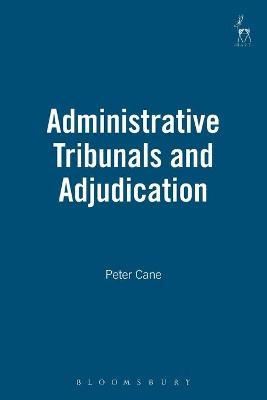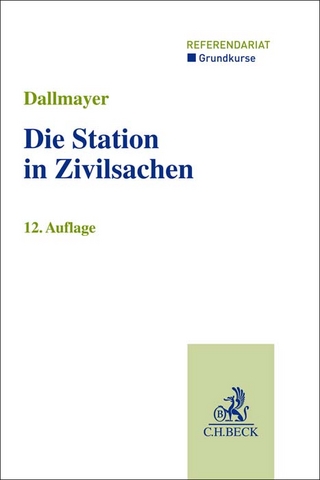
Administrative Tribunals and Adjudication
Hart Publishing (Verlag)
978-1-84946-091-0 (ISBN)
One of the most significant constitutional developments of the past century has been the creation and proliferation of O'administrative tribunals' the main function of which is to adjudicate disputes between citizens and the state by reviewing decisions of government agencies - a task also performed by courts in 'judicial review' proceedings and appeals. Tribunals in aggregate adjudicate many more such disputes than courts, but have received relatively little scholarly attention. This book compares tribunals in Australia, the UK and the US. It offers an account of the concept of 'administrative adjudication', and traces its historical development from the earliest periods of the common law to the twenty-first century. There are chapters dealing with the design of tribunals and tribunal systems and with what tribunals do, what they are for and how they interact with their users. The book ends with a discussion of the place of tribunals in the 'administrative justice system' and speculation about possible future developments.
Administrative Tribunals and Adjudication fills a significant gap in the literature and will be of great value to public lawyers and others interested in government accountability.
Peter Cane is Distinguished Professor and Director of the John Fleming Centre for Advancement of Legal Research at the Australian National University College of Law.
1 Survey 1.1 The Project 1.2 Administrative Tribunals and Administrative Adjudication 1.2.1 The AAT is not a court 1.2.2 The AAT reviews decisions 1.2.3 The AAT's jurisdiction 1.3 The Plan of the Book 1.4 Conclusion 2 History 2.1 Introduction 2.2 1066 to 1800 2.3 19th and 20th Centuries 2.3.1 The UK 2.3.2 The US 2.3.3 Australia 2.4 Conclusion 3 Models 3.1 The UK Model 3.2 The US Model 3.3 The Australian Model 3.4 The French Model 3.5 Conclusion 4 Form 4.1 Membership, Appointments and Composition 4.1.1 Membership 4.1.1.1 Expertise and Specialisation 4.1.1.2 The US 4.1.1.3 The UK 4.1.1.4 Australia 4.1.1.5 The Tasks of Non-court Administrative Adjudicators 4.1.2 Appointment Processes 4.1.2.1 Who Appoints and How? 4.1.2.2 Terms and Conditions of Service 4.1.3 Composition 4.2 Separation and Independence 4.2.1 The UK 4.2.2 Australia 4.2.3 The US 4.3 Structure and Systematisation 4.3.1 Jurisdictional Specialisation 4.3.1.1 Patterns of Specialisation 4.3.1.2 The Theory of Specialisation and Amalgamation 4.3.2 Supervision and Accountability 4.3.2.1 Hierarchical Supervision 4.3.2.2 External Supervision 4.4 Conclusion 5 Function 5.1 Introduction 5.2 Categorising Governance Functions: the Legacy of Montesquieu 5.3 Merits Review 5.3.1 Merits Review is a Mode of Review 5.3.2 The Substantive Element of Merits Review 5.3.2.1 The 'Correct or Preferable' Formula 5.3.2.2 The Basis of Merits Review 5.3.3 The Procedural Element of Merits Review 5.3.4 The Remedial Element of Merits Review 5.4 Merits Review and Judicial Review 5.5 The 'Normative Function' of Merits Review and the AAT 5.6 Merits Review Outside the AAT 5.7 The Nature of Tribunal Review in Comparator Jurisdictions 5.7.1 The UK 5.7.2 The US 5.7.3 France 5.8 Conclusion 6 Purpose 6.1 What is Administrative Justice? 6.2 A Formula for Administrative Justice in Tribunals? 6.3 Jurisdiction 6.4 Standing 6.5 Processes 6.5.1 The Paradigm Mode of Decision-Making 6.5.1.1 The Reviewer 6.5.1.2 The Respondent 6.5.1.3 The Applicant 6.5.2 Alternatives to the Paradigm Mode 6.6 Resources 6.7 Conclusion 7 Landscape 7.1 The Accountability 'Sector' 7.2 Tribunals and Ombudsmen 7.3 Tribunals and Internal Review 7.4 Tribunals and Courts 7.4.1 Australia 7.4.2 The US 7.4.3 The UK 7.4.4 Re-conceiving the Relationship Between Courts and Tribunals 7.5 Tribunals and ADR/PDR 7.6 Conclusion
| Erscheint lt. Verlag | 29.6.2010 |
|---|---|
| Verlagsort | Oxford |
| Sprache | englisch |
| Maße | 156 x 234 mm |
| Gewicht | 490 g |
| Themenwelt | Recht / Steuern ► Allgemeines / Lexika |
| Recht / Steuern ► EU / Internationales Recht | |
| Recht / Steuern ► Privatrecht / Bürgerliches Recht ► Zivilverfahrensrecht | |
| ISBN-10 | 1-84946-091-4 / 1849460914 |
| ISBN-13 | 978-1-84946-091-0 / 9781849460910 |
| Zustand | Neuware |
| Informationen gemäß Produktsicherheitsverordnung (GPSR) | |
| Haben Sie eine Frage zum Produkt? |
aus dem Bereich


